British defence leaders have urged caution in directly applying battlefield lessons from Ukraine to the UK military, warning that the British Army would not fight in the same way and must focus on adapting to future warfare, not copying past conflicts.
Speaking to the Defence Committee during scrutiny of the Strategic Defence Review (SDR), General Sir Richard Barrons, one of the review’s lead authors, told MPs: “We should be absolutely clear that the UK Armed Forces and NATO would not fight a war like Ukraine has to fight war.”
While drones have played a transformative role in Ukraine, Barrons warned that the technological race between drones and counter-drone systems is moving quickly, and future conflicts will require more flexible and updatable solutions.
“Drone technology is about to go through one of those cycles where counter-drone technology will reset the balance of drones in the battle,” he said. “They will come in two shapes… the big, expensive ones you want to come back, and then consumable ones. The last thing that you want is a warehouse full of increasingly obsolete consumable drones.”
Instead, Barrons argued, the key will be manufacturing and updating drones — particularly their electronic warfare capabilities — “at the speed of the war you end up fighting.”
The comments came in response to MP Fred Thomas asking when the British battlegroup in Estonia would be equipped to operate with first-person view (FPV) drones. “It can do it now. It already has them now,” Barrons said, but added that the focus should be on evolving the British Army’s entire concept of operations.
“What we are really talking about is how that evolution of the Army — that battlegroup in Estonia — is a conceptual model for how the land orchestra of war is going to change. Drones will be a fundamentally important part of that, but they are not a magic bullet.”
Former NATO Secretary General Lord Robertson, who also served as a reviewer on the SDR, stressed the broader need for political will to ensure the review is acted upon. “On Monday this week, Secretary-General Rutte delivered a very blunt message to the British people: you either spend 5% or you start learning Russian,” he said. “We all have a responsibility of making sure that the recommendations here… are implemented. The Committee has a responsibility as well.”
Robertson praised the flexible design of the SDR, which allows for acceleration of reforms if the threat environment demands it. However, he pushed back against suggestions that implementation could be delayed: “I do not think we should decelerate, but we can accelerate depending on circumstances.”
On efforts to increase the Army’s lethality, Barrons explained that a typical infantry company of 100 soldiers should, within a decade, be able to destroy ten times more targets in the same amount of time, thanks to improved sensors, coordination, and access to fires.
“In very broad handfuls, that company should be able to destroy 10 times as much enemy in a fixed timeframe as it is capable of doing now,” he said, describing it as “more an attitude and an approach to technology” than a strict formula. “We will know it when we see it.”
The SDR envisions this evolution as part of “Project Asgard,” the Army’s modernisation effort focused on mixing organic, external, and long-range fires in every unit. Barrons concluded that the SDR should be seen not just as a plan, but as a model for how British forces must adapt to future threats with urgency and coherence.
“Now you see how this review team worked,” Lord Robertson quipped. “You have a politician, a soldier and a foreign policy expert. The combination of the three of us has produced this report.”


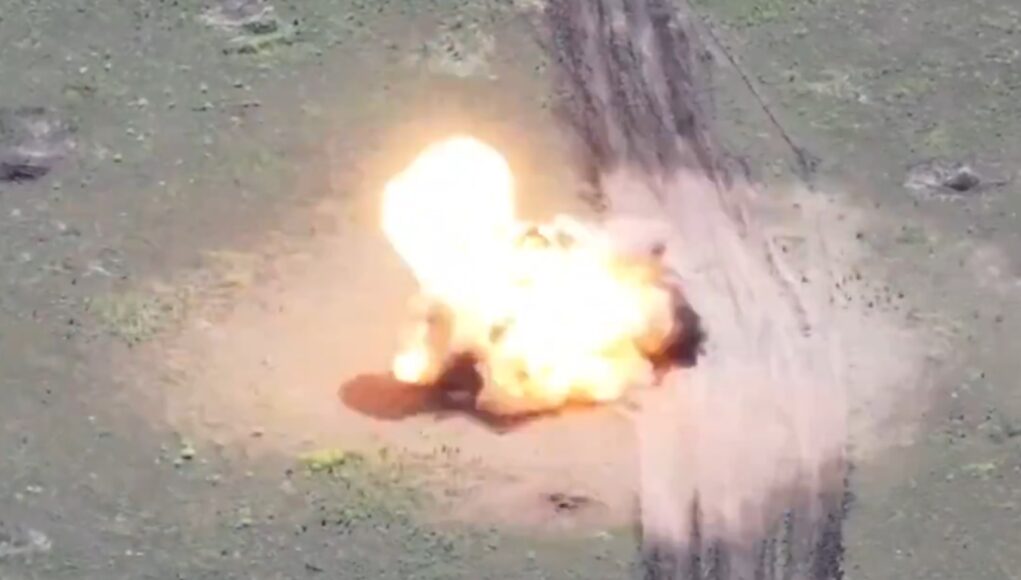

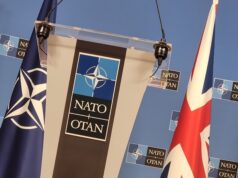
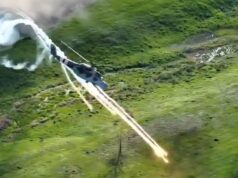
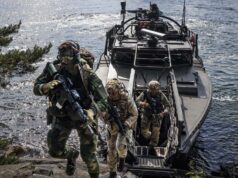
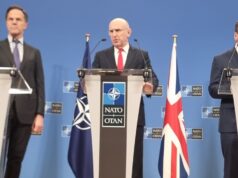
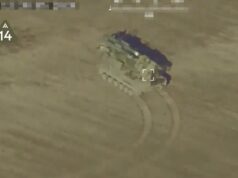
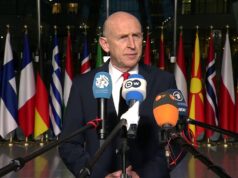
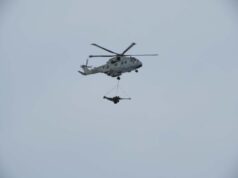



And in that they are right.
UKR has no air space overmatch, ELINT, SAT***s, navy, SSNs…..and the list could go on.
We could have hit so much harder and earlier solo.
The sad thing is that if we had fully backed UKR in week #1 Russia would have been in full retreat and not known what had hit them.
It is still a mystery to me why the whole parade armoured column wasn’t mashed up on day #1 of it being trapped.
‘We would not fight a war like Ukraine has to fight a war.’
But what does that mean? He is, of course, talking about air power. NATO would rapidly win air superiority and then use that advantage to isolate the enemies forward troops who would rapidly run out of ammunition and fuel. Once priority air defence & command and control targets have been taken out they would then go after all the rail hubs, bridges and other choke points. Further roving attacks on the enemy’s ground forces would deny them the ability to manoeuvre. NATO land forces, rather than holding a static linear posture as the Ukrainians have, would engage in high speed manoeuvre warfare, enticing enemy battle groups into operational kill zones where huge amounts of coordinated artillery and air power would kill them.
That’s the idea he is talking about. Think Desert Storm +.
I’m in 2 minds about this, there new lessons and threats to address but mainly it’s reinforced some of the long held traditional aspects of land warfare.
Old lessons reinforced.
Mass has a quality of its own. It’s all fine and Dandy to have a super dooper MBT, SPG, Attack Helicopter, etc etc. But if your enemy has a lot of less able, less complicated and higher availability in their machinery then you may well be in trouble.
The exception to that is high end precision missiles for long range strike and Air Defence.
High end and numerous EW systems aren’t a nice to have they are an essential embedded weapon.
For a while what you start a war is what you may well be stuck with for quite some time. So not only do you need mass of equipment in service, but attrition replacements, adequate spares, maintenance and sufficient stocks of munitions.
Artillery is the God of War (including missiles). So have plenty of it and see the above 2 re high low / mix and stocks.
Intelligence is vital, it saves lives and enables you to be proactive in both Defence and Offence. So Satellites, Drones etc etc plus good old fashioned spy’s.
Reserves, Reserves and home Defence forces Ukraine held out right from the beginning of the War by having a large part of their population trained, armed and easily mobilised to defend their own localities.
New lessons to learn and absorb.
You don’t just look at the biggest, bravest or fittest when recruiting Troops, the nerdy geek who never sees sunlight can be quietly re purposed to drone operator or Cyber warfare.
Small Stealthy unmanned drones possibly with AI can wreak havoc.
We need to reinvent GBAD for the UK from ABM to mobile SHORAD guns and missiles, we need our infrastructure guarding.
I think most folks just don’t realise how vulnerable the UK infrastructure is to very serious damage that can have devastating consequences to society and industry. That needs looking at and I’d start with the Gas and Electricity grids. For example many of our substations contain parts that are very reliable and work fine so no need to replace them under normal circumstances. But they were built by companies that are long gone, have zero spares and no-one just keeps these massive bits of kit in stock. Order time is in years !
It is the lack of resilience/redundancy and hardening that is the issue.
A great post with important points to make 💯
Couldn’t agree more.
National resilience is now mostly focussed on GBAD, hardening and ensuring double or triple redundancy and the ability to rapidly repair or replace battle damage.
Our military sites within the UK need investment to ensure hardening and dispersal is both possible.
I agree the military bases Ned a fresh look at but compared to the civilian infrastructure they are pretty robust, mainly due to the Cold War legacy. Not much use if the entire country grinds to a halt due to the national grid being out of action for months. No lights, no heat, no water, no internet, no phones etc etc.
ABC, in what way are our military bases robust? Very few HAS at RAF and AAC bases. That’s just for starters. No underground shelters for C2 or anything else. Back up generators? Not everywhere.
Little redundancy – only one RAF AT base.
No base is protected by GBAD.
What if the enemy becomes 10 times more lethal and can coordinate weapons equally effectively?
That 100 troops has equal value to the 100 troops. The side with 200 or 300 troops will win..
Fancy words don’t necessarily trump numbers, not when the enemy could be China who will be churning out AI driven weapons. Or nations that China arms.
Reality has long vanished. We have some magnificent equipment but not enough people to man them and next to no ammunition and missiles. If we were to stock up with sufficient missiles, potential enemies would be extremely reluctant to push their luck. Things do seem to be changing for the better but our current enemy is the hordes of consultants doing very well at the expense of our national security.
While we say we won’t fight as in Ukraine will we? If we are in the Baltic countries that really doesn’t give much space for manoeuvre warfare does it?So we could be involved in a static phase holding ground as these countries haven’t actually got the space to give!
Once a Baltic country is invaded the battlespace will open up some-what…
I think you might be somewhat undersetimating just how big the Baltics are. They’re a landmass thats comperable in size to Great Britain (180,000 vs 200,000km2). Riga and Talinn are both ~150miles from the Russian border. Just as a friendly reminder: Kyiv is 60 miles from the border.
Only look little on the map then👍😂
Use the zoom 🙂
Sounds great till you consider that the largest is Lithuania with a population of less than 3 million and Vilnius is less than 20 miles from the Russian border and with Kaliningrad has a Russian border to the east and west.
Um, no? Vilnus is 100 miles from Russia, and Lithunania only has one border with Russia, and that is with Kaliningrad oblast. I would suggest that any Russian forces in that theatre might just have their hands full with 4 Polish divisions moving up from the south and threatening to cut the E-28 to their rear, rather than dashing off 100 miles to the east (something the Russians don’t seem very capable of anyway, remember they struggled with 60 miles to Kyiv) to fight a grinding urban battle in Vilnius.
The one lesson we refuse to learn, is one of mass.
I understand it’s expensive, but even the contingency to build mass quickly if needed is questionable at best.
Poland is buying 1000 tanks NATO supplies the mass
Let’s be fair: I wonder if any Nato country would engage more than 25% of it’s forces…
Felix, We have a big defence budget relative to many other ENATO countries. We should be able to also afford mass.
I do wonder, may be we should. If at least a coalition of willing NATO countries had deployed sufficient forces in UKR to drive Russia out of UKR territory(no further), then all the Rusian threat would be neutralised & Putin & the rest of the axix might be told that naked aggresion will not be tolerated, permitted or appeased. As it is we live on a knife edge of imminant world war, facilitated by a very unstable, derranged POTUS.
Frank, that Russia versus some NATO countries scenario would be WW3.
To be blunt, the United Kingdom should begin seriously considering a post-NATO future. The integrity and cohesion of the alliance have been significantly eroded, particularly during the Trump administration, which introduced an element of unpredictability that has yet to be resolved. In its current state, NATO can no longer be regarded as a consistently reliable foundation for long-term strategic defense planning.
Relying exclusively on integration with NATO is not only short-sighted, it exposes us to the shifting winds of political change beyond our control. As global alliances fray and new security dynamics emerge, the UK must prioritize sovereign defense capabilities and forge new strategic partnerships that reflect today’s multipolar reality—not yesterday’s Cold War constructs.
You can debate its definition, but Western civilisation has been the dominant culture for 2000 years. NATO is a product of its core values and the UK govt is absolutely right to prioritise its health in the face of both external and internal enemies; their primary tactic is to sow mistrust, to divide and conquer. Defending NATO and defending our values is the same thing.
@Paul.P: True, but that doesn’t mean we shouldn’t have a plan B.
Jon, I have faith in NATO enduring for a very long time to come. Trump is no nearer taking his country out of NATO than when he first expressed anti-NATO sentiments in the first year of his first term. Even if the US did leave or at least leave the military structure (as France once did), I see NATO becoming a Europe-Canada defensive alliance. Rutte is now pressing for 3.5 + 1.5% spend by Members and Trump will be more than happy with that marker and its endorsement by the SG.
European nations need a defensive alliance and NATO remains the best option. It has evolved from its Cold War era and is highly relevant today.
Hi, other Jon.
We should be considering a lot of things. However, right now, I agree with Graham, NATO is relatively solid. We can’t afford to fight anything anywhere without allies and we won’t even pay for a military capable of leading an alliance, much less one prepared to go it alone with no alliance.
Social media skews the debate. All those videos of suicide drones about to hit a target. For sure, drones are now important in conflict, but do not forget artillery, tanks & airpower. Just because they do not post as much video, does not mean they are not important.
Barrons doesn’t really explain how he thinks manoeuvre warfare is possible in an era of drones and other more sophisticated PGMs. As a recent piece by RUSI stresses, at the moment, find and fix has gained the upper hand. Russia’s vastly larger air force has failed to establish air superiority, without which its armoured columns have suffered huge losses.
Is the only way to restore manouevre operations to first secure air dominance as in the 2nd Iraq war? Would even that be sufficient in terrain in which concealment of anti armour weapons were easier than in the Iraq semi desert?
More simply, can a US/UK type BCT operate as intended? It is likely to suffer significant losses, with its supporting units even more vulnerable. So plentiful reserves are vital and few NATO members have them.
Peter, air supremacy, or at least local air superiority, has always been a pre-requisite for prosecuting successful manouevre warfar,e not just today but back in the Blitzkrieg days.
Drones are aircraft and as such then air dominance is required. Several ways to achieve that ie several ways to destroy or mitigate drones (and other enemy air assets). Drones are not all-conquering.